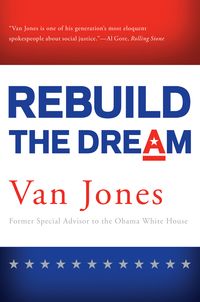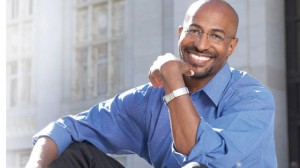Van Jones is perhaps best known as the former green jobs adviser to President Obama who was accused by Glenn Beck of signing a petition saying President Bush was responsible for the 9/11 attacks. Although Jones said he wouldn’t knowingly have signed it, he wasn’t sure whether or not he had by mistake. Jones resigned his position at the White House after six months, giving up, he writes in his new book, “the best job I ever had.”
We caught up with Jones over the phone to talk about Rebuild the Dream, the organization he started in June 2011 to advocate for economic justice; his new book (with the same title) which hit shelves this month; and the strategy he hopes will help progressives win in Washington this winter.
Riley: Why is your organization called “Rebuild the Dream”?
Jones: It used to be that the way you got out of poverty and into the middle class was you would go to college and then buy a home. Today, because of the incredible crushing student loan burden, and the high percentage of American home mortgages being underwater, the same aspirations for education and home ownership are a trap door from the middle class into poverty. We feel like the American dream has just been turned upside down and inside out, and nobody’s doing much about it.
Riley: What are the key initiatives that you’re working on?
Jones: Our two campaigns are pretty straightforward. One, we want to push Fannie and Freddie to more aggressively cut the principle on underwater mortgages. Fannie and Freddie control about half the mortgages in America. Twenty-five percent of all the mortgages in America are underwater. If Fannie and Freddie would reassess America’s home values and go with a fair market valuation, we could save Americans $90 billion, and have a little bit more shared pain between Main Street and Wall Street. That’s a big, important value and fight of ours.
The other one is that we’re passionate about these student loans that are crushing a whole generation of American’s aspirations. Kids are graduating with extraordinary levels of debt, and no jobs. To make things worse, on July 1 the interest rate on the subsidized Stafford loans, the most important student loans, will go up from 3.4 percent to 6.8 percent. That is awful, because those are the loans that you get if you’re smart enough and supported enough to get into college, but you can’t really afford it. Meanwhile banks are getting their money for practically free, with interest rates at a fraction of one percent. There’s no country in the world right now that’s making it harder for their best students to get educated. China, India, Brazil, Germany are all making it easier, knowing that the next generation has to compete in a global market, for their most promising kids to get educated. We’re making it harder.
Riley: You are known for being the green jobs adviser to the Obama administration. This sounds like quite a departure. Why are you personally focusing on these issues?
Jones: Twenty million new people who were in the middle class have been thrown overboard into poverty, or into economic anxiety that feels like poverty.
For economic justice fighters, the entire field has been transformed by the 2008 economic collapse. The field used to be easy to describe, because you knew who your constituents were: They were poor folks in Appalachia, they were black and brown folks in inner cities and they were Native Americans on reservations. That’s it. And you were trying to move people from poverty into the middle class. That was the mission. There’s this new mission now, which is not just to get poor people into the middle class, but to keep middle class people out of poverty.
The kinds of economic problems that middle class and formerly middle class people are facing are different than the problems that the traditionally poor and chronically poor have faced. These are people who often have some educational attainment. They often have a work history. They often have or used to have a credit history that was an asset for them. And yet, they can’t figure out how to stay afloat and make it in America.
If we don’t create a progressive home for them politically, and a progressive agenda for them economically, those people wind up with the Tea Party. Or they wind up in emotional depression and with devastated lives, and then their potential economically, and then as a political force, is dissipated. We’re trying to rise to that challenge.
Riley: In your book, you talk about being a post-hope Democrat. What does that mean?
Jones: Well, that means we’re not going to just vote and hope like we did last time.
Turns out voting and hoping is a bad strategy. You’ve got to vote and march and fight and rally and sit in — do all those things. Democracy is hard work, and it’s not the work of one day.
Post-hope Democrats are basically positioned between the most fanatic of the Obama supporters and the most skeptical wing of the Occupiers, because that’s where most progressives, liberals and independents are. We like Obama. We’re not in love with him like we were in 2008, but we don’t want a Tea Party president. And we love Occupy, but we’re probably not going to a general assembly, and we don’t want to get pepper sprayed. That’s where most of the 100 million Americans [who say they support Occupy] are, between those two poles.
Occupy has done a tremendous service for the country. That said, I think at some point you’ve got to move from anger to answers. I think we have to be as sophisticated as the system that we’re fighting, and I’m not willing to take any tools out of the toolbox in trying to create a country that’s livable for my kids. I want to bring any and all nonviolent tools to the table, and that includes peaceful protest, voting and everything in between. If you don’t vote because the system is corrupt, are you playing tic-tac-toe or are you playing chess? I’m playing chess. I’m not naïve to think that just by voting you get what you want. You cannot get everything you want just by voting. But you can lose everything you’ve got by not voting.
Our organization is really committed to making sure that we don’t just win in November, but also in December, because there are two fights this year, not just one. There’s a fight to deal with our democracy deficit, and try to reelect the president and retake the House in the face of this massive onslaught of corporate money that Citizens United makes possible. Most people have focused on that fight at the ballot box.
But there’s also an economic fight that will culminate in December, and that fight will primarily come down around how the budget deficit gets handled. We need to be able to win politically in November so we can win economically in December. We are training 100,000 people and we’re going to focus our energy on the corporate bad guys this spring, so we can get strong enough to deal with their bought-and-paid-for representatives in D.C. in early winter.
We are trying to learn the lesson from 2008, which is you come out of the voting booth not cheering, but marching.
Further Reading
Visit the Rebuild the Dream website to learn more about the housing and student loan initiatives that Rebuild a Dream is focusing on this spring.


